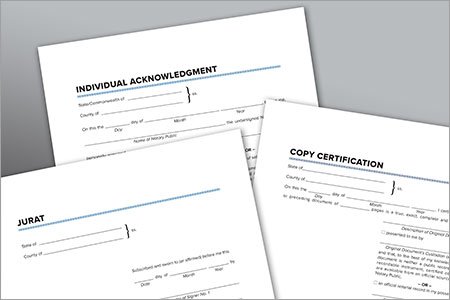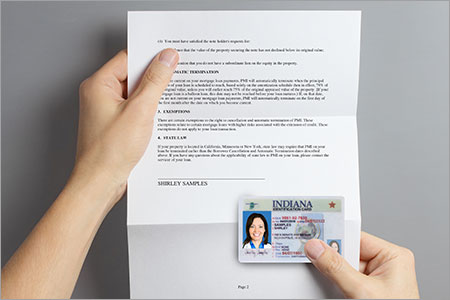How To Get A Document Notarized
If you are a member of the public who needs to have a document notarized, there are several steps you can take to prepare for a smooth notarization. This short guide will explain what customers must bring to a Notary Public and what to expect when requesting notarial services.
Follow these simple steps to get your document notarized:
- Know what type of notarization you need
- Make sure the document is complete
- Bring acceptable identification
- Ensure the name on your ID matches the name on your document
- Have all signers present for the notarization
- Be aware and willing to sign
- Know what you will be paying
Know What Type of Notarization You Need
As the signer, you must tell the Notary what type of notarization you need. Notaries can describe what the primary notarial acts are, but they cannot recommend one over another. It's illegal for a Notary Public to give advice like this unless they are also a licensed attorney.

Generally, notarizations come in three basic types:
- Acknowledgments — The purpose of an acknowledgment is to declare that you have willingly signed a document.
- Jurats — The purpose of a jurat is for you to swear or affirm that the contents of the document are true.
- Copy Certifications — The purpose of a certified copy is to have the Notary confirm that the copy is an exact match of the original. This is not allowed in all states.
If you're not sure what kind of notarization you need, contact the document drafter or receiving agency to confirm what notarial act they require before you visit the Notary. If in doubt, you may contact a lawyer for guidance.
Make Sure the Document is Complete
Generally, a document must be 100% complete for a Notary to perform a notarization. Make sure there aren't any blank spaces on your document before you meet with a Notary because that could make the document more susceptible to fraud. For example, an empty line for critical date or interest rate information on a loan document could cause serious trouble for the borrower if the information is added after the form is notarized.
Many states require Notaries to either refuse a notarization on an incomplete document or tell the customer that the document must be completed before it can be notarized. A Notary is not allowed to advise you on the legal effects of a document or fill in any part of the document except the notarial certificate wording.
Bring Acceptable Identification
The primary duty of a Notary Public is to verify your identity as the document signer. The most common way they determine that you are who you say you are, is by checking state-issued identification documents, like driver's licenses and passports. Notaries need to see a form of identification that meets requirements set by state law, so make sure you have acceptable ID for notarization ahead of time.
If you don't have an ID credential that will work, you might be able to use "credible identifying witnesses." These are people who will swear to the Notary that they know you. If you're able to use this option, your witness(es) must have a form of identification that meets state requirements.
Ensure the Name on Your ID Matches the Name on Your Document

If you've recently changed your legal name due to marriage, divorce or other reasons, be sure that the ID you bring to the notarization matches your name shown on the document.
If there's a significant discrepancy — for example, your married name appearing on the document is "Mary Smith-Williams" but your ID contains your maiden name of "Mary Smith" — then the Notary will not be able to proceed with the notarization unless you can provide an alternate form of acceptable identification that matches the name on the document.
Have All Signers Present for the Notarization
A signer must meet face-to-face with a Notary in order to have their signature notarized. Be sure that any person whose signature needs notarization is available and can attend your appointment with the Notary Public.
A Notary cannot notarize a person's signature over the phone or video chat. That said, several states do allow you to get documents notarized by using secure online remote notarization service providers like NotaryCam,* Notarize, and DocVerify. This guide will help you find a Notary when you're ready.
Be Aware and Willing to Sign
One of the basic duties of a Notary is to screen document signers for willingness and awareness. That means a Notary will check that you are mentally aware and alert at the time of the notarization, and that you are signing the document voluntarily and not under duress.
While this is essential for persons of all ages, it is particularly important for the elderly or infirm. If you do not understand the details of your transaction, or you aren't sure you want to sign the paper in front of you, take steps to address these issues before going to a Notary appointment.
Know What You Will Be Paying
In most states, the maximum fees Notaries may charge are set by law. You can also check your state Notary regulating agency's website (usually the Secretary of State's office) to find out what the notarization fees are.
Travel and convenience fees for mobile Notary services may or may not be governed by state law. Most mobile Notaries will charge a separate fee for these services. Make sure you discuss and agree on any additional fee(s) before the Notary travels to your location.
What to Bring to a Notary
When you're preparing for a notarization, double-check that you have all essential items for the process to go smoothly. Here is what you'll need to bring with you when getting something notarized:
- The completed document you wish to notarize
- Valid photo ID that meets state requirements
- Any other individuals (with proper ID) who will be signing the document
- Payment for notarial services
Can Any Document Be Notarized?
Virtually any document can be notarized. However, exceptions are vital records such as a birth, marriage and death certificates. Notaries can't make or certify copies of these records. You must go to the government agency that issued the certificate to get copies.
Choosing a Qualified Notary Public
In most cases, customers are dealing with papers containing highly sensitive information when seeking the services of a Notary Public. So, it's important to find a qualified Notary who understands your state's laws.
Look out for a few red flags before using a Notary's services. Notaries are not allowed to give legal advice or translate their title into foreign languages. Con artists use those methods to take advantage of immigrants who may not be familiar with the differences between the duties of American Notaries and Notaries from their home country.
Need to Get Something Notarized?
*Disclosure: The NNA has a referral agreement with NotaryCam. We may receive compensation if you use the link above to get remote notarization services.
How To Get A Document Notarized
Source: https://www.nationalnotary.org/resources-for/public/how-to-prepare-for-notarization
Posted by: jentforely.blogspot.com

0 Response to "How To Get A Document Notarized"
Post a Comment